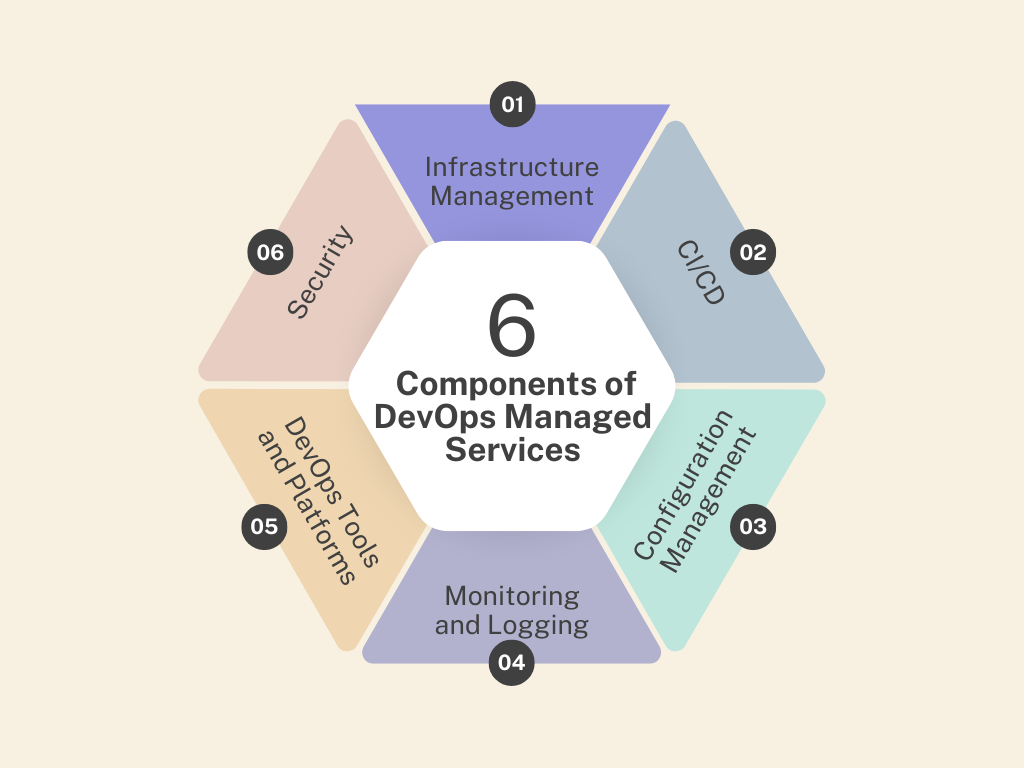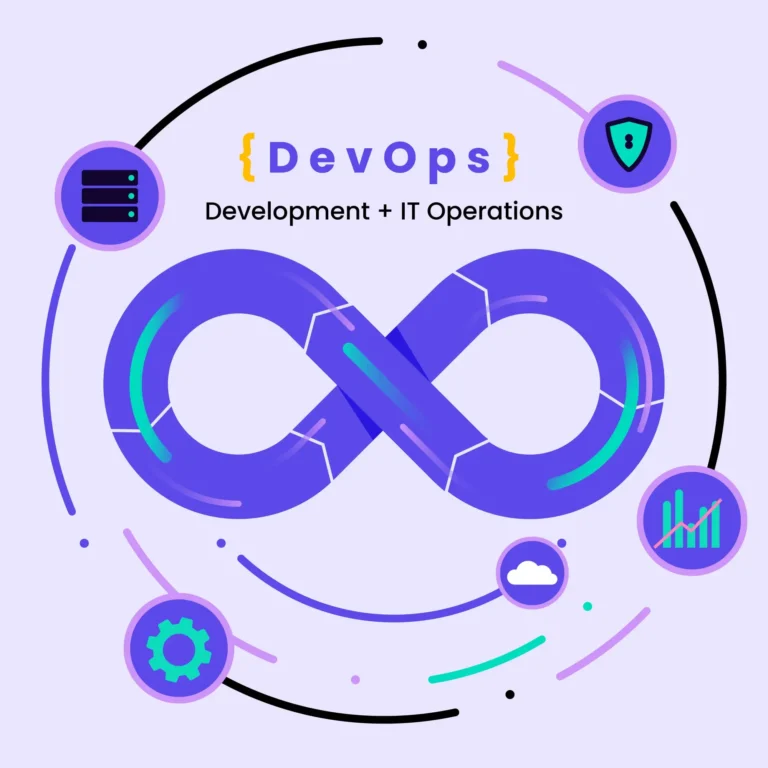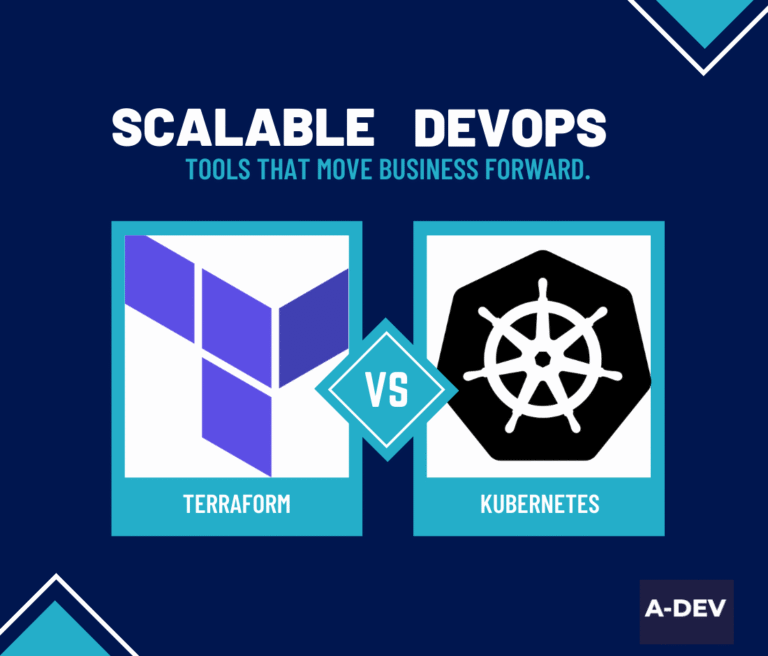Delivering software faster, while improving quality and reliability is a key focus for today’s organizations. DevOps, therefore a strategic initiative has even come into being to reduce the gap between these operations and development. Development, operations and QA processes are often highly complex — which can make it difficult to structure end-to-end DevOps workflow in a way that encapsulates all potential benefits of the approach.
By giving the tools, infrastructure as well as expert guidance to streamline your software development lifecycle (SDLC), DevOps managed services comes up with a solution for that. Enterprises can tap into subject-matter expertise while lowering operational overhead and remaining laser focused on their strategic business goals through an experienced DevOps managed service provider.
In this blog, we will go over what are the significant advantages of DevOps managed services along with their primary features that need to be part and parcel while choosing your ideal service provider who can carve out your success story for you.
What are DevOps Managed Services?
DevOps managed services, therefore streamline the software delivery process that allows automation in code testing & deployment. Organizations can shorten time-to-market while maintaining integrity and reliability through faster workflows — with expert knowledge at the ready.

DevOps Managed Services Defined
DevOps managed services provide you a whole lot of solutions to speed up your software development life cycle (SDLC). Using an experienced team of DevOps experts, cutting-edge tools and time-tested methodologies, these services allow companies to speed delivery times as well as increase collaboration all while improving the quality of applications.
Key Components of DevOps Managed Services

Critical components that are usually included in devops managed services:
- Infrastructure and Cloud Management: Manage, optimize cloud resources; from provisioning to config thru ongoing maintenance and scale.
- CI/CD — Automate Build, test and Deploy Pipelines to deliver Software Faster.
- Configuration Management: Provides consistency and reproducibility between different environments by use of infrastructure as code practices
- Monitoring and Logging — Building effective monitoring solutions that provide insight into system performance, fault detection & automatic notifications along with uptime.
- DevOps Tools and Platforms: Making extensive use of version control, collaboration, automation & deployment tools.
- Security –Working on securing the Data by building in security practices throughout SDLC to safeguard sensitive data and reduce risks.
Benefits of a DevOps Managed Service Provider

According to one of the study results, by partnering with a managed service provider there will be around 59% increase in business productivity and almost half reduction less frequent bugs changes involves on average than before. Among the numerous benefits are:
- Faster time-to-market: Faster release of code means faster delivery to the customer.
- Increased Productivity: Automate repetitive tasks and reduce manual errors, doing so throughout the entire cloud-based processes.
- Advanced Collaboration: Build upon and improve collaboration between operations teams that produce systems of production (without providing anything) with development groups creating the sites, tearing silos.
- Improved reliability: This is achieved by setting up proper monitoring and incident management processes, to reduce unplanned downtimes.
- Scalability quickly and easily: scale infrastructure and resources in response to business needs with minimal downtime
- Cost Optimization: Save costs on your cloud with efficient resource management to reduce operational expenses.
- Expertise: Utilize experienced, skillful DevOps professionals.
- Delegation of Core Competencies: Allow internal teams to focus on larger strategic initiatives.
Meanwhile, they may outsource the task of a DevOps engineer to an APM/Managed Service Provider and improve their application modernization changes holistically — enabling them to derive the competitive edge on offer in this market.
Managed Services: The Key to Streamlined DevOps

Managed Services to Overcoming DevOps Challenges
While there is so much potential in embracing DevOps, its successful implementation does not come easy! Challenges such as: Feeling overwhelmed with what an organization can take on
- Skill Gaps: No in-house DevOps expertise, challenge to hire specialized talent.
- Tool Complexity: DevOps tools and platforms are endless, causing workflows to be in an inefficient loop.
- Infrastructure Management: Manually managing complex infrastructure and ensuring high availability can be very time consuming.
- Problems with collaboration: Overcoming team silos to improve communication and take shared responsibility.
- Security: Continued focus required to secure incurred sensitive data and adhere with regulations.
Managing the tasks and processes of traditional IT teams can be oversimplified, but managed services take on these challenges by providing all needed skills, tools and solutions to make operations simple. Collaborating with professional service providers helps organizations identify and find solutions to challenges, allowing them to concentrate on their core business models.
Case Study: Bluestep Bank Streamlines Azure Infrastructure with Managed Services
Bluestep Bank, a leading lender in the Nordic region, faced several challenges in managing their Azure infrastructure. They lacked in-house DevOps expertise and had a mix of manual and IaC-managed resources, leading to inefficiencies. Partnering with a DevOps managed service provider allowed them to:
- Automate infrastructure compliance with Azure Policies, ensuring consistent security and best practices across their cloud environment.
- Optimize their IaC codebase through a comprehensive audit. This not only improved efficiency but also identified areas for improvement within their existing Terraform and legacy Bicep templates.
- Streamline release and patch management processes for Azure services and Kubernetes. This resulted in significantly faster patching cycles (reduced from 5 days to 7 hours) and improved overall system reliability.
As a result of these efforts, Bluestep Bank achieved several key benefits:
- Compliance: They achieved 100% compliance for new infrastructure and significantly improved compliance for existing resources (87% compared to 45% at the beginning). This ensured they met strict regulations like GDPR standards for handling personal data.
- Efficiency: Patching times were dramatically reduced, saving valuable time and resources.
- Security: Automated compliance and optimized infrastructure enhanced overall security posture.
The success story of Bluestep Bank exemplifies how DevOps managed services can empower organizations to overcome challenges, optimize their infrastructure, and achieve significant business benefits.
Building a Strong DevOps Foundation with Managed Services

Developing a strong DevOps base is critical for sustained success. A solid foundation is formed and strengthened by managed services in the following ways:
- Implementing Best Practices: Stay true to established DevOps principles and techniques seen throughout the industry.
- Fostering a DevOps Culture: Collaboration, Automation and Continuous Improvement.
- Providing Ongoing Support: Expert guidance and help from us throughout the DevOps journey.
Organizations can develop a strong DevOps culture and construct an environment for future expansion by working with managed DevOps services provider.
Continuous Integration and Continuous Deployment (CI/CD) with Managed Services
Always a foundational practice in software development to speed the time-to-market, improve quality of the delivered product and optimize resources – CI/CD has emerged as an even bigger asset since devOps era. CI/CD automates the build, test and deployment phases allowing developers to work with operations teams so that they all collaborate smoothly delivering value faster towards an end customer.
Accelerating Software Delivery Through Managed CI/CD
DevOps managed services act as a catalyst in speeding up software delivery;by giving experts support and highly advanced CI/CD pipelines. By automating and orchestrating, managed services simplify the GS process from a code commit to production deployment. This innovation deliver freedom, speed and agility when coupled with cloud-based infrastructure and the latest generation tools. Success in DevOps initiatives is important, and managed services can help greatly offer the best support for effective project management.
Managed CI/CD services offer several key benefits:
- Reduced deployment times: Streamlined pipelines and automated testing accelerate the release process.
- Improved software quality: Early detection of defects through continuous testing and validation.
- Enhanced collaboration: Improved communication and coordination between development and operations teams.
- Increased efficiency: Automation of repetitive tasks frees up valuable developer time.
- Risk mitigation: Early identification and resolution of issues through continuous monitoring.
Best Practices for CI/CD Implementation
Best Practices for CI/CD to get maximum advantage from it:
- Version control: Use solid version control systems, such as Git to keep up with any code alterations.
- Automated testing: Add unit tests to be able enforce code quality and functionality.
- Ongoing monitoring: Keep an eye on performance of the system and detect potential problems before they become a big issue.
- Infrastructure as Code: Define infrastructure in configuration management tools.
- Collaboration and communication: Encourage collaboration, open team thinking.
Establishing well-structured and reliable CI/CD pipeline can boost business success by adhering to the best practices with utilizing capabilities of DevOps managed services.
Selecting the Right DevOps Managed Service Provider

As a deeply involved DevOps managed service providers make all the difference to an effective outcome. When deciding, you should take the following factors into account:
Provider Selection Criterion
- Reputation and Experience: The ideal provider has a long record of successful DevOps projects within multiple industries.
- Service Offerings: Determine whether the provider offers services that match your requirements, such as CI/CD, cloud management capabilities and expertise in migrating to or securing a particular cloud.
- Industry Alignment: Engage with a provider who has already worked on projects in your industry to take advantage of their domain expertise.
- Technology Stack: Look at how well does the provider knows your tech stack and can integrate with what you have.
- Pricing Model: There are many pricing models available to choose from (fixed fee, hourly rate, outcome based) so determine which suits your budget and project requirements.
- Customer Support: Check the responsiveness and availability permitted by your provider as well the quality of its problem solving techniques.
Assessment of Service Delivery Capabilities and Skills
To make an informed decision, it’s essential to evaluate a provider’s capabilities and expertise:
- Technical Skills: Assess the provider’s proficiency in DevOps tools, technologies, and best DevOps practices.
- Industry Certifications: Look for certifications that validate the provider’s expertise (e.g., AWS, Azure, Kubernetes).
- Case Studies: Review the provider’s case studies to understand their approach and outcomes.
- Customer References: Obtain user insights whatsoever your current customers or former clients.
Establishing a Successful Partnership
You must have a robust partnership with DevOps managed service provider in order to thrive. Here are some things to consider.
- Communicate Clearly: Create communication lanes that allow for open and transparent messaging to keep all teams aligned on a common message.
- Collaboration Arrangements: Have aligned goals and KPIs. Don’t leave anything up in the air with terms such as value or savings percentages; define what success looks like on paper (more to come soon).
- Knowledge Transfer: Provide a platform to encourage knowledge exchange between the provider and your team.
- Flexibility: Select a provider that can grow alongside your business.
With a comprehensive analysis of all these factors and with successful partnership organizations can derive maximum benefits from the DevOps managed services solutions whatever business goals they want to achieve.
Conclusion
So DevOps managed services are playing a vital role in the new software development era and offering organizations an added advantage to compete today. Managed DevOps services enable the businesses to receive expert knowledge, advanced tools and optimized business processes which can only assist in speeding up how software is delivered from development to production.
With the demand for speed and innovation climbing, these managed DevOps services are going to become more important in helping companies drive business success. Through a DevOps service provider, organizations can achieve optimal performance and cost savings without compromising their ability to delight customers.
Finally, DevOps managed services are a must for organizations that aim to survive in this digital era. The meaning is clear, business have more chances of long-term growth and success by adopting DevOps infrastructure as approach for transformation.






